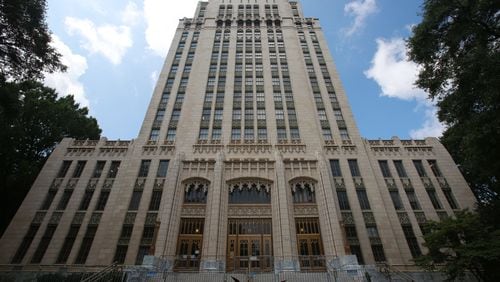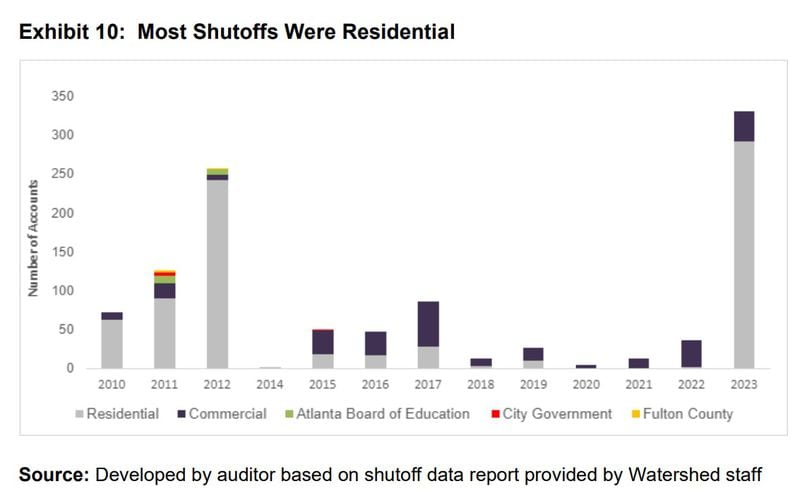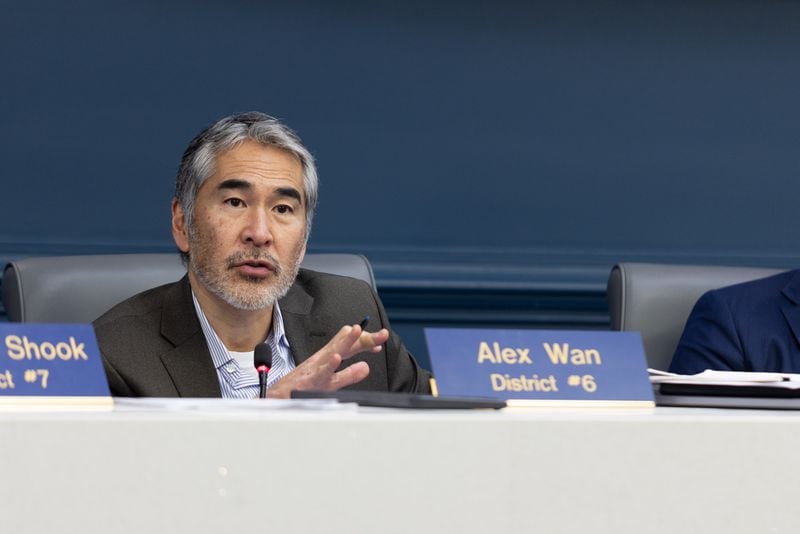Some time within the last decade, an Atlanta mayor instructed the city’s Department of Watershed Management to stop terminating water service for residents who failed to pay their bills, citing a looming recession.
At least, that’s what the department’s staff told the Auditor’s Office during an investigation into the city’s water billing and collections procedures. The particular mayor who gave the order was not named.
Since the “unofficial and undocumented” request was made, the Watershed Management department “has not consistently enforced water shutoffs for nonpayment since 2010,” the audit found.
The practice has come with a massive price tag: as of June 2023, the city has racked up a total delinquent balance of about $197.8 million from about 54,000 residents across the city who haven’t paid their water bills.
And of the nearly $200 million in outstanding payments, $137 million is from water accounts that are still active.
The eyebrow-raising findings from the auditor’s office were finalized last month and presented to Atlanta City Council members during the City Utilities committee meeting Tuesday.
“We undertook this audit because the Department of Watershed Management has not consistently enforced collections since 2010,” Ijegayehu Jones, with the auditor’s office, told council members. “City Council expressed concerns about collections and the amount of uncollectible debt the department has not yet written off.”
According to the audit, the watershed department terminated service for only 737 accounts from 2010 to 2022.
Credit: Courtesy of the City Auditor's Office
Credit: Courtesy of the City Auditor's Office
Former Mayor Keisha Lance Bottoms suspended water shutoffs for delinquent payments in March 2020 during the height of the COVID-19 pandemic like many local governments who adjusted services for struggling residents.
The moratorium ended in May 2021, “however, the (watershed) department did not immediately resume service termination for nonpayment until February 2023,” the report says.
Watershed Commissioner Mikita Browning said the department has actively been working to mediate the outstanding balances.
“The resumption of shutoffs has resulted in more customers paying on time and in full,” she said. “As you know, we have 200,000-plus accounts to tackle and we’re taking one bite at a time appropriately to ensure that as many of our customers come into compliance” as possible.
In January of last year, city officials also announced the end to the F.L.O.A.T. (Flexible Levels, Options, and Affordable Terms) assistance program that offered an incentive to single-family residential customers with past due accounts to settle the outstanding charges and avoid water shutoff.
But the program only helped rectify around $12 million in outstanding balances, according to the audit.
In 2022, the watershed department warned it was going to cutoff service to some 27,000 residents. At the time the total delinquent balance had reached $130 million.
The watershed department is able to write-off uncollectible debt, however, hasn’t gone through the legislative process to do so since 2019.
The auditor’s office identified more than 21,000 accounts with outstanding balances totaling around $64 million that may meet the parameters for a write-off. After six years, the ability to write-off the delinquent balances drops drastically.
Council member Alex Wan, former chair of the finance committee, said he recognizes that the watershed department walks a fine line between the customer’s ability to pay and the city’s need to collect outstanding dues.
“If our outstanding balance is almost $200 million …that — pardon the pun — is almost the equivalent of taking the tax dollars we’re getting and just letting it go down the drain for a year,” he said. “We’ve got to keep that in perspective on how big this is.”
Atlanta isn’t the only local government that’s has struggled with high rates of delinquent payments.
DeKalb County ended it’s long-standing ban on disconnecting water service for unpaid bills in 2021. At the time, 66,000 of the county’s residents had outstanding balances and the change prompted thousands to sign up for payment plans. Advocacy organizations like the NAACP Legal Defense Fund pressed DeKalb CEO Michael Thurmond to extend the deadline.
City Auditor Amanda Noble said she did believe that the department was working to alleviate the problem but the inconsistent shutoffs has some Atlanta residents feeling accustomed to free water services.
“Because, as we said in the report, there was a culture among some people who probably can afford to pay just not paying because nobody is going to do anything about it,” she said.
Since the watershed department resumed shutoffs, the report found, only 292 residential accounts have been shut off as of July 2023.
Credit: Jenn Finch
Credit: Jenn Finch
Years of high rates, persistent issues
A nationwide analysis of water bills released last month revealed that water and sewer bills for Americans have increased 56% since 2012.
Atlanta’s water and sewer rates have been historically among the highest in the nation and issues with the city’s infrastructure has caused headaches for years.
DeKalb County and the city of Atlanta are under federal mandates to improve wastewater systems, having paid hundreds of thousands of dollars federal penalties for chronic problems and fixes. In 1998, under Former Mayor Bill Campbell’s administration, the city entered into a consent decree to address a federal lawsuit over water quality violations.
When Former Mayor Shirley Franklin was in office, the city used revenue from the Municipal Optional Sales Tax to fund a $3 billion sewer repair project — earning her the title of the “sewer mayor.”
The tax has helped avoid a water and sewer rate hike for customers which will remain the same through June of this year. According to the city, Atlanta’s water and sewer rates have not increased since 2012.
At the same time as bills have gone uncollected, the city’s water meters have become increasingly faulty with age. If a meter for users account can’t obtain an accurate reading, the department estimates a rate for the customer.
The audit found that the rate at which the watershed department estimates bills is far over industry standards and increased significantly within the past three years.
Browning told council members that the city is looking to replace old meters.
“We do recognize we have a lot of age meters and infrastructure on the ground right now,” she said. “But we’re looking to begin the process of swapping out those meters over a three to five year timeframe.”









